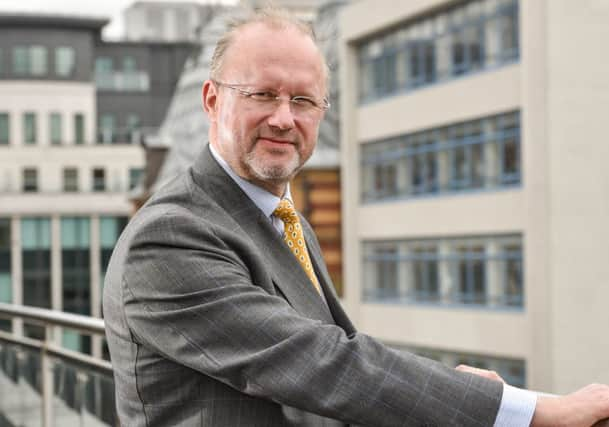‘Spending cuts put protection of liberty on the back burner’


BRITAIN is in danger of turning the clock back to the 1700s because of cuts in state spending on the legal system, according to Richard Marshall.
Mr Marshall is a seasoned participant in the region’s legal sector, who has transformed Lupton Fawcett Denison Till into one of the 10 largest firms in Yorkshire.
Advertisement
Hide AdAdvertisement
Hide AdAlthough his firm has prospered by responding positively to the changing legal landscape, Mr Marshall is acutely aware of the problems faced by many of his fellow lawyers. According to the Law Society, the Ministry of Justice’s latest cuts undermine the duty of the Government to fund access to justice for anyone accused of wrongdoing. These concerns are shared by Mr Marshall.
“We’ve recently seen the huge attacks on publicly-funded work,’’ he told me. “There’s a risk of us moving back to 19th, if not 18th century, levels of representation.
“We had the flagship legal system for the world, and now we seem to put the protection of liberty and the proper protection of individuals from prosecution, and the right to defend themselves properly, somewhere on the back burner.”
The Ministry of Justice argues that changes in areas such as criminal legal aid are designed to deliver value for money for taxpayers, and the reforms will put the profession on a sustainable footing in the long term.
Advertisement
Hide AdAdvertisement
Hide AdThe cuts in legal aid are the latest in a series of challenges faced by all law firms.
However, during a period of economic contraction, Lupton Fawcett Denison Till kept on growing. Over the last six years, the firm has made four big acquisitions. In January 2009, it acquired the entire traditional commercial and private client business of Leeds firm Fox Hayes. In August 2009 it acquired Hackett Windle, a firm of solicitors and chartered tax advisers based in Sheffield.
In December 2010, the firm recruited 40 of the former staff of Sheffield firm Ashton Morton Slack, as well as securing a series of senior lateral hires. In 2012 it acquired the business of Leeds-based Lee & Priestley, and in the following year, it merged with York-based Denison Till.
As managing director, Mr Marshall now presides over a firm with 280 staff spread across offices in Leeds, Sheffield and York. But the firm hasn’t pursued growth for its own sake.
Advertisement
Hide AdAdvertisement
Hide Ad“The world fell off a cliff in 2008, with Lehman brothers and the rest of it,” he recalled. “We decided to focus on having a business fit for purpose now and in five years’ time. We needed to be resilient, well-positioned and profitable, in that order.”
Mr Marshall set out with the goal of establishing Lupton Fawcett – as it was then known – as the “region’s mid-market law firm of choice”.
He added: “We’ve succeeded in delivering the widest offering of any mid-market firm, but we need more strength and depth in various areas and we need to plug one or two gaps.
“We realised that we also needed to add real quality. Quality in our environment is often difficult to define; it’s too often a statement of warm intent rather than a reality.
Advertisement
Hide AdAdvertisement
Hide Ad“We concluded that the route to deliver quality that meant something was through lean management and process mapping. It’s a long term investment that can’t happen overnight, and requires a big shift of culture, which itself is so very important.”
The firm also had to meet challenges around pricing.
“The chargeable hour is by no means dead, but it is certainly dying,” said Mr Marshall. “Clients are interested in paying for outputs, rather than paying for inputs. We need to know the hours we’re putting in to things as a measure of the cost to us, but that’s not necessarily the measure of cost to the client. We’ve been working very closely with pricing consultants, and invested six figures of hard cash into delivering real, innovative and interesting alternative pricing models built around real transparency and real choice.”
You also can’t overlook the role of technology in delivering modern legal services, Mr Marshall said
“We realised the way to do all of those things is to grow,’’ he added. “We needed to be turning over something around £25m, and employing 400 people. But that isn’t a strategy; it’s a tactic. We’re growing to deliver the underlying strategy; delivering a platform that’s best able to deliver the client services that our clients require.
Advertisement
Hide AdAdvertisement
Hide Ad“We put as much emphasis on the delivery of private legal services as we do business legal services; providing wealth creation services to our clients in their commercial capacity and wealth preservation services to them in their private capacity. We see it as a virtuous circle.”
The firm’s recent expansion has highlighted the glorious, rich diversity of the county’s economy.
“Each of our three markets has different nuances,’’ Mr Marshall said. “Leeds is very much about financial services, banking and professional services, Sheffield is far more driven by manufacturing and education, and York has nuances around ecclesiastical, landed estates and agriculture and tourism.”
And what of the long term future? Well, in five years’ time, Mr Marshall, who has been with the firm since 1992, hopes it will have delivered its strategy.
Advertisement
Hide AdAdvertisement
Hide Ad“The firm will then have choices about where it goes,” he said. “They will be able to decide whether they join in the trend towards consolidation; either be consolidated or become a consolidator; to raise external capital or not raise external capital, to stay independent or not. The point is to have those choices, and as the region’s mid-market law firm of choice, we’ll be in an incredibly strong position to take advantage of the new legal market place.”